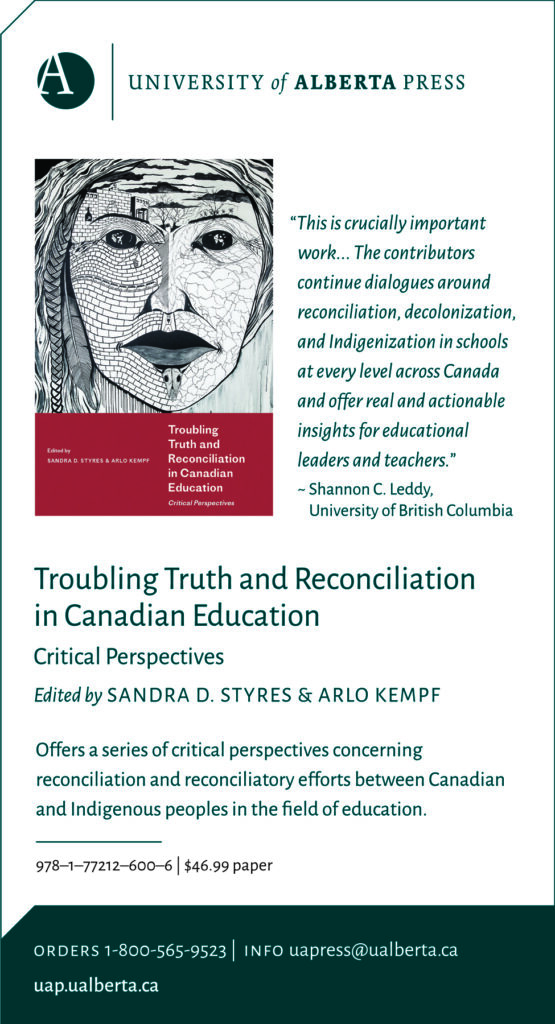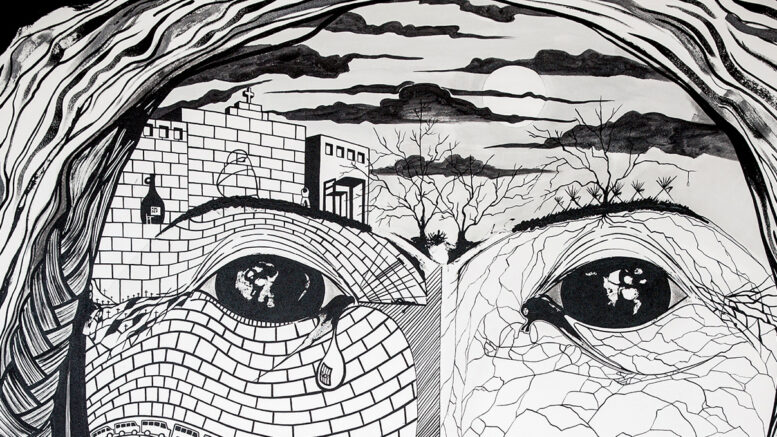By Regan Treewater, Local Journalism Initiative Reporter
(ANNews) – Since Pope Francis’ historic visit to Canada, and his touring of former residential school sites, many across the country are left pondering what ‘reconciliation’ entails, and the vital role education will play in this process moving forward. A new collection of scholarly essays, titled Troubling Truth and Reconciliation in Canadian Education, edited by Sandra D. Styres and Arlo Kempf, and published by University of Alberta press examines this complex subject.
In her foreword Jan Hare comments, “As an Indigenous scholar, educator, and administrator, I could see the ways reconciliation as a discourse was being transposed into faculties of education and K to 12 schooling across Canada. Reconciliation as a framework for education has inspired formalized responses in postsecondary education institutions that include strategic plans, task-force recommendations, symposia, symbolic representations on campus, Indigenous advisories or boards, Indigenous community engagement initiatives, and professional development for staff and faculty.”
 “Faculties of education have introduced required coursework in Indigenous education or integrated Indigenous curriculum across their programming, hired Indigenous faculty, created reconciliation councils, and hosted reconciliation events. I continue to observe the strong and focussed way the concept of reconciliation takes hold in educational spaces, especially when it facilitates decolonization, and more recently Indigenization,” postulates Hare further.
“Faculties of education have introduced required coursework in Indigenous education or integrated Indigenous curriculum across their programming, hired Indigenous faculty, created reconciliation councils, and hosted reconciliation events. I continue to observe the strong and focussed way the concept of reconciliation takes hold in educational spaces, especially when it facilitates decolonization, and more recently Indigenization,” postulates Hare further.
Yet, the goals of ongoing reconciliation in Canada and education’s role therein, as Hare would agree, demand further evolution past the conceptual. This sentiment is echoed later in the publication by Frank Deer: “In order to engage in adequate explorations of the unique experiences indigenous peoples, for which specific manifestations of indigenous knowledge, heritage, consciousness, and tradition are relevant, deliberate ways in which we approach their meaning and application are necessary.”
Dr. Sandra Styres is an Associate Professor in the Department of Curriculum, Teaching, and Learning at the University of Toronto and holds a Canada Research Chair. She is of Kanien’kehá:ka, English, and French descent.
In 2009 she was honoured with the presentation of an Eagle Feather by the Tecumesh Centre for Aboriginal Research and Education at Brock University. Also, from the Department of Curriculum, Teaching, and Learning, Arlo Kempf is a specialist in the study of antiracism and anticolonialism in the K to 12 setting rounding out their editorial balance of expertise.
“Our stories are sacred, they are spirit, they are ceremony, and they are medicine. Our stories ground our understanding of our relationships and responsibilities to our places. They also guide our ways of being in the world and heal our soul wounds,” explain Styres and Kemp in their article Reconciliation and Relational Ethics in Education.
This ultimate aspiration to heal national and cultural wounds, so deep that they seem to have no bottom, is a monumental undertaking whose impact will only be qualitatively and quantitatively discernable after several decades of dedicated methodical pedagogical application, as the authors of the collection agree. Certainly, promoting increased understanding of the magnitude of Canada’s colonial footprint will take several generations to come to fruition.
“I asked for forgiveness for what has been done, which was genocide, and I did condemn this,” declared Pope Francis during his recent Canadian tour. Translated from Spanish to English by his interpreter, many in Canada continue to feel that the use of the specific term “genocide” when referencing the Catholic Church’s role in the residential school system, was long overdue.
Although the Pope’s categorizing of residential schools as systematic and calculated “genocide” cannot change the insurmountable social damage and cultural trauma that have resulted, the implications that this will have for ongoing education are potentially ground-breaking.
The Pope’s acknowledgment of the Church’s participation in what many in Canada have long referred to as “genocide” will forever endow the institution with concrete culpability.
“Reconciliation is a complex and challenging endeavour that necessitates first identifying the effects of settler colonialism on educational practices and then finding ways to begin decolonializing those practices,” explain Styres and Kempf.
Although the collection of scholarship is not solely focussed on the residential school system, recent events add a layer for further reflection when processing the publication through the lens of greater efforts to decolonialize Canada’s education institutions.
“We seek to nuance the ways settler normativity is learned and expressed at the expense of nonnormative citizenship, when both normative and nonnormative Canadian identities depend on Indigenous erasure. We ask, in other words, how it is that we learn a hierarchy of belonging to a place premised on Indigenous removal, erasure, and genocide,” write Lucy El-Sherif and Mark Sinke.
In their article Some of Us Are More Canadian Than Others: Pedagogies of Citizenship and Learning Racialized Settlerhood El-Sherif and Sinke examine the pertinent and excruciatingly uncomfortable question of how newcomers and immigrants to Canada become endowed with ‘settler’ identities.
“I am a Muslimah, white-passing immigrant to Canada with lived experience of being visibly Muslim,” writes El-Sherif. “I am continuing to learn the implications of this exaltation of whiteness that deludes my conceptions of Canadian militarism and multiculturalism, and that requires an exceptionally high cost to maintain. This cost is especially born by Indigenous people whose stories are overwritten with narratives of Canadian settlement and development so that I can presumably belong in Canada without having to engage in any meaningful way with the realities of dispossession and genocide.” El-Sherif and Sinke’s article is perhaps the most stinging indictment of recent trends in Canadian cultural acclimation and national identification.
Troubling Truths and Reconciliation in Canadian Education is both practical and highly sophisticated in its collective approach to examining and evaluating factual and authentic teaching surrounding Indigenous history, culture, and shared generational settler responsibility. At times the truths being explored can be uncomfortable, but the pain associated with analyzing these inconvenient realities speaks to the necessity for confronting them actively. As Canadians continue to wrestle with the larger implications of ‘reconciliation,’ this is an engaging and provocative read that adds texture and nuance to an integral and fundamental part of defining a Canadian national identity.
Troubling Truth and Reconciliation in Canadian Education (ISBN 978-1-77212-600-6) was published by University of Alberta Press and is available at uapress.ualberta.ca. It is also available in print, EPUB and pdf.



Be the first to comment on "Examining truth and reconciliation in education"